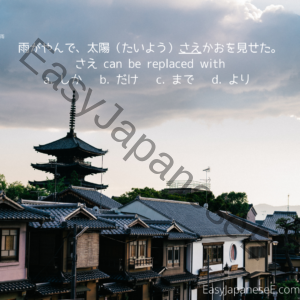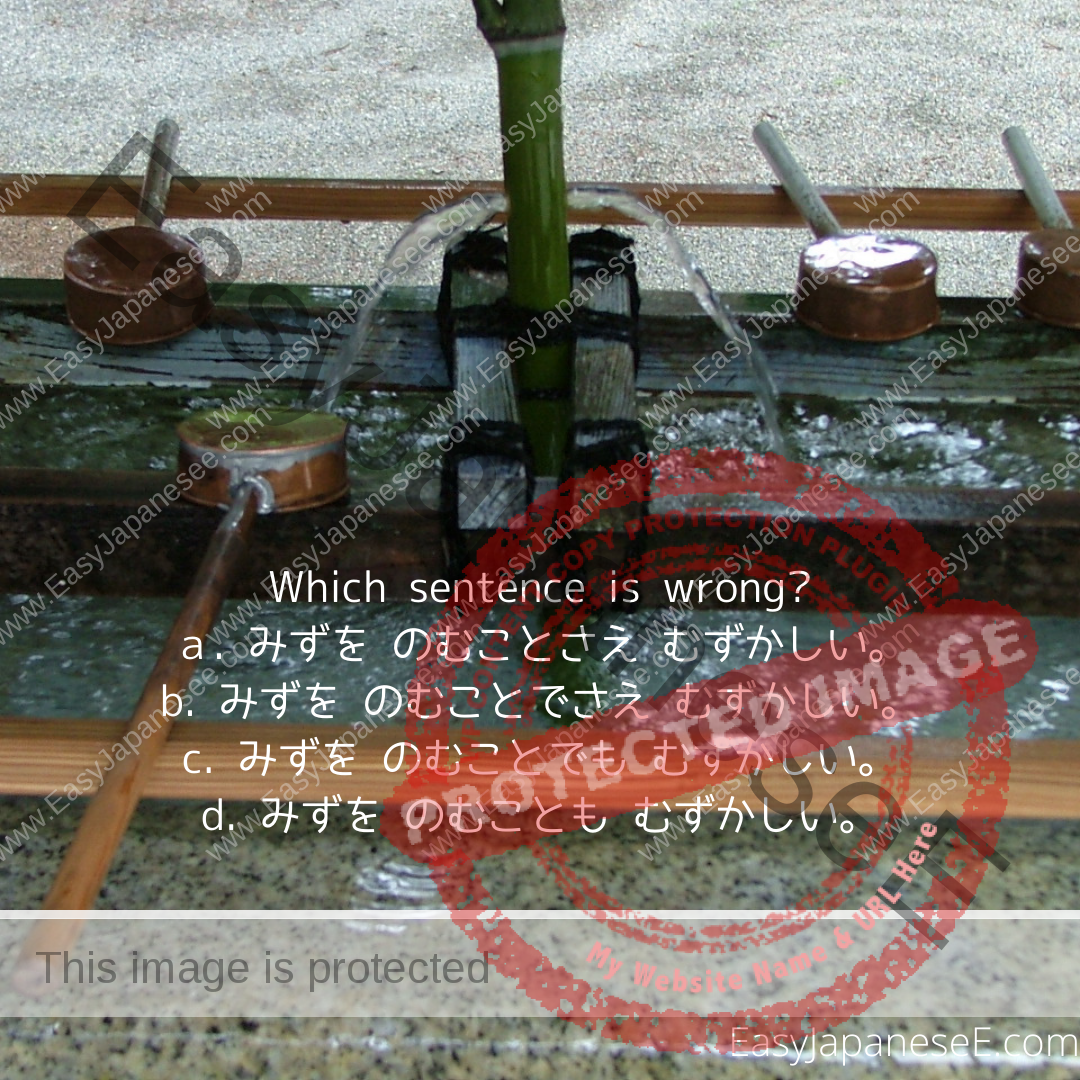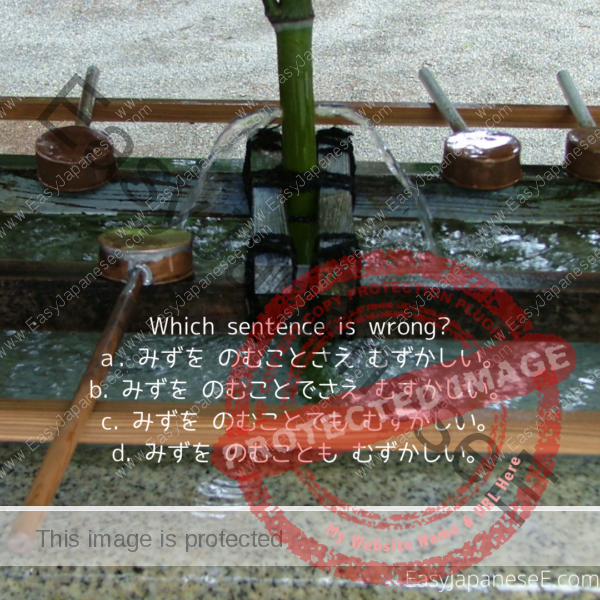
Today’s Grammar Point: ~さえ/~でさえ
Yesterday, I talked about the ~さえ that indicates “accumulation” and that ~さえ can be replaced with ~まで.
Today, I’m going to talk about ~さえ which is used to give an extreme example and let others guess the rest. This ~さえ cannot be replaced with ~まで but can be replaced with emphasising も although the extreme feel gets (slightly) reduced with も.
Connections
- [noun] (+ [particle])* + さえ
- [plain form verb] + こと (+ [particle])* + さえ
*さえ usually replaces particles は、が、を but if any other particle is needed, that stays. - [てform verb] + さえ
Examples
息子はアイスクリームさえ食べない。(さえ is replacing を)
≒息子はアイスクリームも食べない。
My son doesn’t eat even ice cream.
あの子は自分の名前さえ書けない。 (さえ is replacing が)
≒ あの子は自分の名前も書けない。
That child cannot write even his own name.
トイレにさえ一人で行けない。(This に is the destination marker thus cannot be replaced by さえ)
≒ トイレにも一人で行けない。
I cannot go alone even to the toilet.
自転車でさえ10分かかる。 (This で is the means marker thus cannot be replaced by さえ)
≒ 自転車でも10分かかる。
Even on a bicycle it will take 10 minutes.
雨の後でさえ、すずしくならない。(This で is a time marker thus cannot be replaced by さえ)
≒ 雨の後でも、すずしくならない。
Even after the rain, it doesn’t cool down.
水を飲むことさえ難しいんです。 (さえ is replacing が/は) (Today’s Caption Sentences)
≒ 水を飲むことも難しいんです。
Even drinking water is difficult.
私はその本をまだ開けてさえいない。
≒ 私はその本をまだ開けてもいない。
I have never even opened the book.
歩いてさえ間に合う距離です。
≒ 歩いても間に合う距離です。
You’ll make it even if you walk.
負けてさえ、悲しそうじゃない。
≒ 負けても、悲しそうじゃない。
Even after losing the match, he doesn’t look sad.
~でさえ
When ~さえ follows a noun directly (as ~さえ usually replaces particles は, が or を, this happens quite often) and means “even,” で is often added before さえ, and this でemphasises the meaning of さえ even more (no pun intended). Although you don’t need to remember this, this で is not a particle specifying “means,” “place of action,” “time,” etc., but this で is the てform of the affirmative auxiliary verb です/だ.
雨が止んで、太陽さえ顔を見せた。(≒雨が止んで、太陽まで顔を見せた。)
≒雨が止んで、太陽でさえ顔を見せた。
The rain stopped and even the sun showed up.息子はアイスクリームさえ食べない。(≒ 息子は アイスクリームも食べない。 )
≒ 息子はアイスクリームでさえ食べない。
My son doesn’t eat even ice cream.
As shown above, “[noun] + さえ” can be replaced with “[noun] + で + さえ” even when さえ can be replaced with まで but it seems to me that adding で happens more often with the さえ that can be replaced with も. Now one thing clear here is that once で is added in front of さえ, さえ can no longer be replaced with まで. So you cannot say 雨が止んで、太陽でまで顔を見せた. However, with も the story is not that simple.
~でさえ vs ~でも
“[noun] + で + さえ” can sometimes be replaced with “[noun] + で + も” but not always. This happens because, while both “[noun] + で + さえ” and “[noun] + で + も” emphasise the extreme nature of the situation, “[noun] + で + も” has the focus on the deviation from the norm, so if the sentence does not let us assume the norm which makes a contrast with the extreme situation shown in the sentence, “[noun] + で + も” cannot be used. See below.
(✓) 日曜日でさえ仕事に行かなければならない。
(✓) 日曜日でも仕事に行かなければならない。 (I have to go to work even on Sundays, let alone on weekdays (the norm).)
I have to go to work even on Sundays.(✓)そんなことは 子どもでさえわかる。
(✓)そんなことは 子どもでもわかる。 (Even a child can understand, so adults (the norm) should be able to understand.)
Even a child can understand that.
For the above examples, we can assume the norm from the sentence. However, in the examples below, we cannot assume the norm, thus we cannot replace でさえ with でも.
(✓) あの子は自分の名前でさえ書けない。
(×) あの子は自分の名前でも書けない。 (Wring his own name is the least expectation. There is no norm suggested here.)
That child cannot write even his own name.(✓)のどが痛くて、 水を飲むことでさえ難しい。
(×)のどが痛くて、 水を飲むことでも難しい。 (There is no norm that suggests drinking water is an extreme deviation from it.)
As I have a sore throat, even drinking water is difficult.
Answer to today’s question: c (for meaning see above)
All the other sentences mean: “Even drinking water is difficult” but as “drinking water” is not a deviation from any norm, でも cannot be used.
If you liked this article, please share it with your friends using the social media buttons below. Also, your clicks on ads on this page help covering the cost of running this website. Your support will be much appreciated.
- さえ
~さえ・・・ば、—。
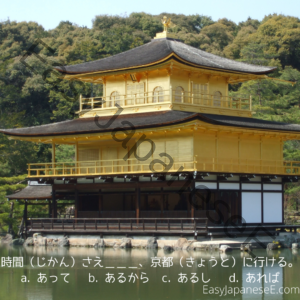
~さえ/~でさえ
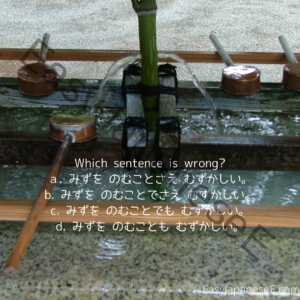
~さえ
